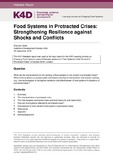| dc.contributor.author | Quak, Evert-jan | |
| dc.date.accessioned | 2018-11-26T15:29:02Z | |
| dc.date.available | 2018-11-26T15:29:02Z | |
| dc.date.issued | 2018-09-25 | |
| dc.identifier.citation | Quak, E. (2018). Food Systems in Protracted Crises: Strengthening Resilience against Shocks and Conflicts. K4D Helpdesk Report 447. Brighton, UK: Institute of Development Studies. | en |
| dc.identifier.uri | https://opendocs.ids.ac.uk/opendocs/handle/20.500.12413/14145 | |
| dc.description | This K4D Helpdesk report was used as the input report for the K4D Learning Journey on Changing Food Systems’ second thematic session on ‘Food Systems in the Context of Protracted Crises’ (4 October 2018, London). | en |
| dc.description.abstract | Food systems are changing and will continue to change in the near future due to many transformative drivers, such as population growth, globalisation, climate change, and pollution. The K4D DFID Learning Journey on Changing Food Systems examines several of these drivers. A key trend in food systems is that food insecurity and malnutrition are increasingly concentrated in countries with protracted crises. This rapid literature review provides an overview of the recent evidence on what food systems look like in protracted crises and the interventions mentioned in the literature to build more resilient food systems against shocks and conflicts.
According to the FAO (2018, p.5), 40% more of ongoing food crises are considered to be protracted than in 1990; approximately half a billion people are currently affected by protracted crises, mainly situated in sub-Saharan Africa and the Middle East; and, the majority of humanitarian assistance between 2005 and 2015 was directed at protracted crises. Almost all countries going through a protracted crisis (the FAO currently counts 19 countries) have experienced some form of violent conflict over a prolonged period and 13 countries are still affected by conflict. Overall:
- The number of conflicts is increasing and the world is becoming more violent, in increasingly intractable ways (IEP, 2018).
- Data from the Uppsala Conflict Data Programme shows that non-state conflicts have increased by 193% from 2010 to 2017, surpassing all other types of conflict to the highest level since it started measuring conflicts in 1975.
- Since 2010, there has been a rising trend in the proportion of people in countries with protracted crises facing undernourishment, whereas it has been declining for all other developing countries (FAO, 2016b). This shows that conflict compounded by fragility and other stress factors leading to protracted crises substantially increases the likelihood of undernourishment.
Almost 122 million, or 75%, of stunted children under age five live in countries affected by conflict (FAO/WFP, 2017). | en |
| dc.language.iso | en | en |
| dc.publisher | IDS | en |
| dc.relation.ispartofseries | K4D Helpdesk Reports;447 | |
| dc.rights.uri | https://www.nationalarchives.gov.uk/doc/open-government-licence/version/3/ | en |
| dc.subject | Agriculture | en |
| dc.subject | Nutrition | en |
| dc.subject | Poverty | en |
| dc.subject | Rural Development | en |
| dc.subject | Security and Conflict | en |
| dc.title | Food Systems in Protracted Crises: Strengthening Resilience against Shocks and Conflicts | en |
| dc.type | Other | en |
| dc.rights.holder | UK Government | en |
| dcterms.dateAccepted | 2018-09-25 | |
| rioxxterms.funder | Department for International Development, UK Government | en |
| rioxxterms.identifier.project | K4D | en |
| rioxxterms.version | VoR | en |
| rioxxterms.funder.project | 238a9fa4-fe4a-4380-996b-995f33607ba0 | en |

